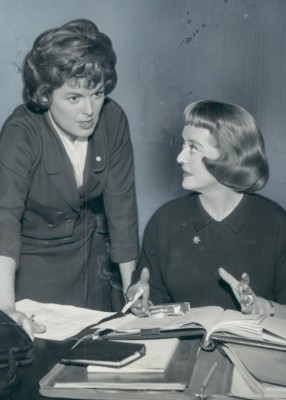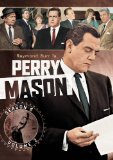| Reviews & Columns |
|
Reviews DVD TV on DVD Blu-ray 4K UHD International DVDs In Theaters Reviews by Studio Video Games Features Collector Series DVDs Easter Egg Database Interviews DVD Talk Radio Feature Articles Columns Anime Talk DVD Savant Horror DVDs The M.O.D. Squad Art House HD Talk Silent DVD
|
DVD Talk Forum |
|
|
| Resources |
|
DVD Price Search Customer Service #'s RCE Info Links |
|
Columns
|
|
|
Perry Mason - Season 6, Volume 2
With one major exception, that is. I've yet to hear the full story, but apparently sometime in the early fall of 1962, star Raymond Burr suddenly needed surgery, effectively putting him out of commission for four full episodes right in the middle of the season. In a very unusual move discussed in more detail below, the decision was made to bring in four fairly big stars to pinch-hit for Burr, each playing a colorful lawyer only peripherally connected to Perry and his team. None of these episodes are particularly good, but at least they break away from a formula that was already starting to wear a little thin.
This set offers "The Case of the Two-Faced Turn-a-bout," "The Case of Constant Doyle" (the only previously released episode of this set) as well as cases about lawful Lazaruses, elusive elements, potted planters, and witless witnesses. As before, by TV standards of the day Perry Mason remains a slickly-produced series with excellent production values and top-drawer guest casts. But as even Burr himself admitted, these later seasons shows had become so Byzantine and impossible to follow that watching them I thought to myself, Ah, this is what slipping into senility must be like - watching a TV show and being able to follow only what's happening at that particular moment, while the big picture remains totally incomprehensible.
(See below for comments relating to this set)
Really at the core of Perry Mason's appeal is its cast, and that's hardly changed at all. Besides ingenious, resourceful Perry Mason (Burr), the famous Los Angeles attorney who never loses a case, there's Perry's loyal, tireless personal secretary, Della Street (Barbara Hale), and their worldly, slightly cynical pal/colleague, P.I. Paul Drake (William Hopper). Cases usually have them up against easily-aggravated, perennial loser D.A. Hamilton Burger (William Talman).
Also in the cast, sort of, is actor Ray Collins (Citizen Kane, The Magnificent Ambersons), a fine actor who in Perry Mason's first five seasons played slippery Lt. Arthur Tragg, Burger's colleague and a veteran cop who derived much pleasure in arresting Perry's distressed clients. Collins was suffering from emphysema around this time, and is visibly thinner and frailer than the robust older man he was when the series debuted. Although credited in each show he's actually only in three of the 14 episodes here. After that point, he made only a handful of brief appearances, though he must have been liked because he continued getting screen credit on each episode until the day he died.
Wesley Lau, as Lt. Andy Anderson, took up the slack; he began subbing for Collins near the beginning of season five. Just past forty, he was significantly younger than the 72-year-old Collins and he puts a slight spin on things. Where Tragg sort of represented an older-generation, L.A. Confidential-type detective who gleefully arrested people, Anderson was more the by-the-book if slightly generic modern ideal of the LAPD. The Anderson character, coupled with his pathetic batting average, also somehow made Hamilton Burger more sympathetic. He was a formidable, coldly-calculating opponent of Perry's in early seasons, but by this point you've really got to feel sorry for the guy.
Essentially a mystery show with a courtroom setting for its climax, Perry Mason's single flaw is that as a mystery it doesn't really play fair with its audience, though the same could be said for B-movie mysteries of the 1930s and '40s, radio mystery shows, and virtually all other TV whodunits. Sherlock Holmes and Hercule Poirot (to name two examples) faced seemingly irresolvable cases with bizarre, inexplicable clues, yet the solutions were always quite simple and logical. The great literary detectives simply had powers of observation lost on us mere mortals, even though we're armed with the same information as those protagonists.
On the other hand, Perry Mason, the Charlie Chan movies, Murder, She Wrote, etc. operate under a different set of rules. The resolutions to the mysteries don't always make sense and audiences often don't have access to the same clues the protagonists do, and they often leap to conclusions and solve crimes in ways that don't hold up to scrutiny. Instead, these kinds of movies, TV and radio shows rely heavily on atmosphere, characterization and star power to entertain their audiences. One might guess who the real murderer is, but in most cases you won't be able to solve the mystery on your own.
Fortunately Burr, Hale, and Hopper are just wonderful in their roles. Apparently they became close friends in real life, and this camaraderie very much extends to their scenes together on the show. About the middle of season two, Talman's Hamilton Burger started getting more shading, a welcome addition. Often regarded as television's most thankless role, Hamilton Burger this season still is Perry's weekly nemesis but now he's more affable outside the courtroom and flexible in, especially when new evidence casts a shadow of a doubt over the guilt of Perry's client.
Notes About Season 6, Volume 2: The reason Burr couldn't star in four whole episodes remains unclear. One source claims Burr needed "minor dental surgery" but that can't be right. Even major dental surgery probably wouldn't have sidelined him more than a few days, certainly not the four or five weeks these shows would have needed to get in the can. A biography of Burr claims it was instead an intestinal operation, and that makes more sense. Burr does make a brief appearance in each episode but he's otherwise MIA, Perry like Burr supposedly sidelined by surgery, with the famous lawyer making just one or two brief cameo appearances from his hospital bed or, later, while convalescing at home.
Whatever was wrong with Burr, it couldn't have been elective surgery given its timing. Most TV dramas of the period were star-driven affairs, unlike the ensemble make-up of most shows today. Oddly, no one thought to build an entire episode around Della Street or Paul Drake, a shame. Maybe there just wasn't time. Oddly, most of the time Barbara Hale and William Hopper actually have less screentime than normal rather than picking up the slack, while Ray Collins appears in just one of these episodes.
The four teleplays, assuming they began as Perry-centric scripts, have all been substantially reworked to accommodate these independent attorneys and the guest stars playing them: Bette Davis, Michael Rennie, Hugh O'Brian, and Walter Pidgeon.
Davis, by far the biggest star of the four, was limiting her TV appearances to about one a year and was fresh off her biggest later-career success, the movie What Ever Happened to Baby Jane? (1962), although she struggled to cash in on this newfound fame. She comes off very much the Hollywood star gracing everyone with her scintillating screen presence, and in a sense she was right: her appearance probably boosted Perry Mason's ratings.
Hugh O'Brian's appearance plays almost like an unsold pilot, the actor cast as a glamorous playboy, attorney to the stars. That show is weak despite much international Cold War intrigue. So too is "The Case of the Surplus Suitor," the one featuring Walter Pidgeon. While that script is a let-down Pidgeon himself is excellent. Granted, Perry's courtroom theatrics had long been the rule rather than the exception, but Pidgeon's slight-of-hand at the dénouement actually surprises.
But it's the Michael Rennie show that stands out. He plays a law school professor who hasn't been in court in years, but is compelled to help one of his students accused of murder. Rare for Perry Mason, Rennie's character actually evolves over the course of the show, gradually changing his attitudes toward academia, law theory, and in-the-trenches advocates.
Guest stars in this set include Kent Smith, Constance Towers, Patricia Breslin, Barry Atwater, Don Dubbins, Joyce Van Patten, Barbara Pepper, Michael Parks, Peggy Ann Garner, Les Tremayne, Neil Hamilton, Dick Wilson, Patrice Wymore, Ruta Lee, John Hoyt, Harry von Zell, Dan Seymour, Michael Fox (a recurring role), Lisa Gaye, Abraham Sofaer, Robert F. Simon, Werner Klemperer, Berry Kroeger, William Woodson, Joyce Bulifant, James Best, Carl Benton Reid, Linden Chiles, Andrea King, Hayden Rorke, Arthur Hunnicutt, Natalie Trundy, Erin O'Brien, Lee Van Cleef, Vic Perrin, David McLean, Irene Hervey, Max Showalter, Patricia Barry, Virginia Gregg, Anna-Lisa, Richard Webb, Julie Adams, Richard Jaeckel, Marvin Miller, John Zaremba, Gloria Talbott, Gerald Mohr, Douglas Henderson, George Macready, Billy Halop, John Anderson, Marianna Hill, George Kennedy, Faith Domergue, Keith Andes, Peggy McCay, Frank Aletter, Michael Pate, Dabbs Greer, Pat Finley, Constance Ford, Paul Fix, Mark Goddard, Joe Maross, Robert Foulk, Robert Middleton, David White, Jackie Coogan, Steve Brodie, Florida Friebus, Vaughn Taylor, and Harry Holcombe, with Willis Bouchey, Grandon Rhodes, Morris Ankrum, S. John Launer, Kenneth MacDonald, John Gallaudet, Jamie Foster, and Charles Irving playing judges. Arthur Marks, Allen H. Miner, Jesse Hibbs, Harmon Jones rotated directing chores.
Video & Audio
CBS DVD's Perry Mason - Season 6, Volume 2 presents 14 terrific-looking episodes spread over four single-sided, dual-layered DVDs. The black and white full-frame image is very sharp and detailed with strong blacks. The Dolby Digital English mono is generally quite good, too. Episodes are not time-compressed, with some running up to 52 minutes. The music does not appear to have been altered. The discs are closed-captioned, though no other subtitle option is offered.
Extra Features
None.
Parting Thoughts
Once again, Perry Mason's half-season sets continue chugging along quite nicely, at a reasonable pace and with high quality transfers always. It's a terrific show and if you've been buying them all along you won't be disappointed here. Highly Recommended.
Stuart Galbraith IV's latest audio commentary, for AnimEigo's Musashi Miyamoto DVD boxed set, is on sale now.
|
| Popular Reviews |
| Sponsored Links |
|
|
| Sponsored Links |
|
|
| Release List | Reviews | Shop | Newsletter | Forum | DVD Giveaways | Blu-Ray | Advertise |
|
Copyright 2024 DVDTalk.com All Rights Reserved. Legal Info, Privacy Policy, Terms of Use,
Manage Preferences,
Your Privacy Choices | |||||||















